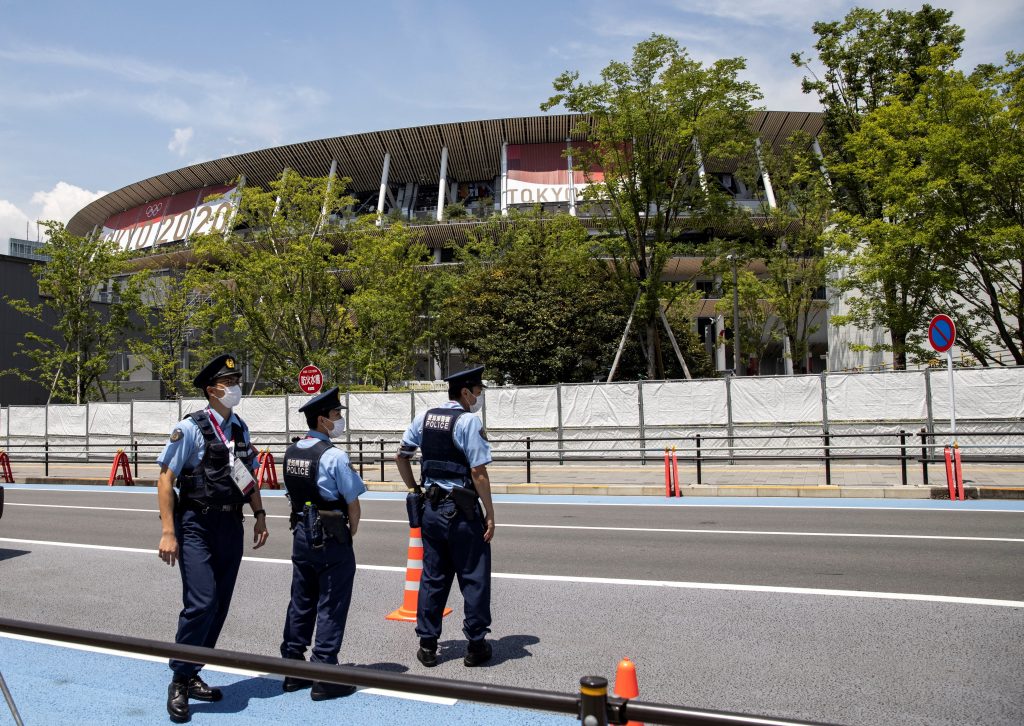
- ARAB NEWS
- 18 Jul 2025

TOKYO: Japanese police have started taking full-fledged security measures ahead of the opening of the Tokyo Olympics on Friday.
A total of some 60,000 personnel, including officers from Tokyo’s Metropolitan Police Department and eight prefectural police departments, as well as those dispatched as support members from other police departments across the country, will engage in security activities such as guarding venues and dignitaries during the Tokyo Olympics and Paralympics.
Although there will be no spectators at most Olympic venues due to the resurgence of the new coronavirus in the country, the Games will still be under heavy security.
Usually, routes connecting venues and nearby train stations are put on full alert as such “last mile” routes are prone to slip-and-fall accidents and terrorist attacks when they become crowded before and after events.
But with spectators banned from most venues and public viewing events canceled in Tokyo, security staff will be dispatched mainly around venues and busy train stations.
Security dogs will also be deployed at the Japan National Stadium, the main venue for the Tokyo Games, and the Olympic and Paralympic athletes’ village to search for suspicious objects.
A balloon with a camera attached was floated about 100 meters above Tokyo’s Daiba waterfront area to keep a high level of vigilance in the area, where the Olympic cauldron and several venues are located.
In order to counter possible terror attacks using drones, the police will use jamming devices to disable suspicious drones so that they can be captured with a net hanging from a large-size drone.
Terror attacks and other violent incidents have happened during past Olympic Games.
“The Olympics is a large-scale event that attracts attention from people across the world and is a perfect opportunity for terrorists to spread fear,” a Japanese crisis management specialist said.
In the 1972 Munich Olympics, 11 Israeli athletes were killed by members of a Palestinian terrorist group. A bombing happened at the Centennial Olympic Park in Atlanta during the 1996 Atlanta Olympics.
The Tokyo Games are unlikely to be attacked by foreign terrorists as chances are low for them to succeed in sneaking into Japan given the absence of spectators from abroad. Meanwhile, Japanese police are increasing their vigilance against possible attacks by homegrown terrorists, who are directed or inspired by foreign terrorist organizations, and also against attacks by lone wolves, who have no connection with any extremist group and commit violent acts individually.
“It’s terrifying that mounting stress from the virus crisis or dissatisfaction with society could prompt some people to harbor radical beliefs,” said a senior police official.
Car-rental agencies are urged to strengthen their measures to confirm the identity of users and report to the police if they find anything suspicious, while transportation companies are asked to strictly manage their trucks and call the police if any vehicle is stolen.
Concerns are also growing over possible cyberattacks targeting the Tokyo Games.
The Metropolitan Police Department launched a team to handle cybercrimes in March last year. In late June this year, the team started conducting 24-hour surveillance and information collection activities to bolster its vigilance against cybercrimes.
During the period of the Tokyo Games, the team will dispatch staff members to the organizing committee for the Games and the Tokyo metropolitan government to swiftly share information on cybersecurity, traffic jams and accidents.
Also, a designated team to handle coronavirus infections among people taking part in guard activities has been established. The team will engage in work to sterilize equipment and facilities and also in the transportation of infected people.
Security staff members will work in units so that one unit can replace another in case infections spread extensively within a unit.
In an address made at a security training exercise in June, Minoru Saito, chief of the MPD, called on police officers to “show the fruits of the strategies we developed over more than seven years, as well as those of training.”
Meanwhile, East Japan Railway Co., or JR East, is set to enhance security at major stations and on Shinkansen bullet trains during the Olympics and Paralympics, using weapons detection dogs and security cameras capable of finding suspicious items and people.
The security operations will be carried out in partnership with Central Security Patrols Co.
After suspicious people are identified, their baggage will be inspected by security guards. Aboard Shinkansen trains will be guards with body cameras.
Picked to work as detection dogs are two species, the Labrador Retriever and beagle, which have a very keen sense of smell. Their appearances, which will unlikely make people feel scared, are another reason for the choice, according to JR East.
On Monday, media people were invited to a station in Tokyo to see how the dogs work. The dogs detected a hazardous item in a bag carried by a person who was playing the role of a suspicious figure while patrolling around train ticket gates and informed their human partners of the finding.
“We aim to carry out our mission without disturbing train and station users as much as possible,” a Central Security Patrols official said, adding, “We hope to obtain everyone’s understanding.”
JIJI Press